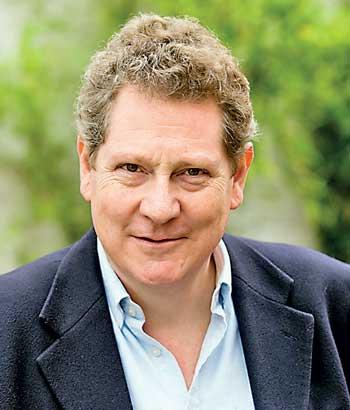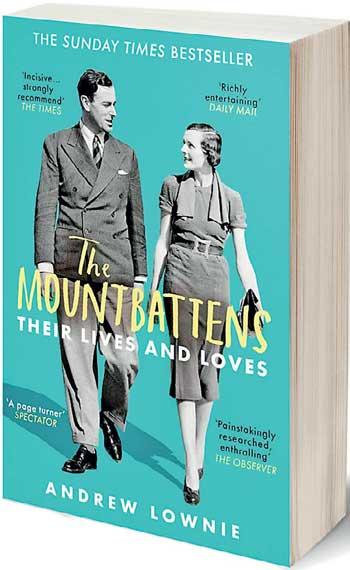My new book on the Duke and Duchess of York is about living people, is more journalistic, requiring interviews in the absence of files, and has more legal problems. I’m also more reliant on news cuttings, which are not always accurate, and talking to people who are reluctant to talk.
 Prize winning historian and biographer, Andrew Lownie is well known for his biography of British diplomat and spy Guy Burgess (“Stalin’s Englishman”) as well as the top-ten Sunday Times bestsellers on the British monarchy, “The Mountbattens: Their Lives and Loves” and “Traitor King: The Scandalous Exile of the Duke and Duchess of Windsor”. Lownie battled against the British Cabinet against censorship and right to information when he wrote a biography of the Mountbattens in 2019, incurring over £400,000 in legal fees in the process. His next book is on the Duke & Duchess of York. Lownie is also the founder of his own agency – the Andrew Lownie Literary Agency, a leading British agency for non-fiction, especially history, and biography.
Prize winning historian and biographer, Andrew Lownie is well known for his biography of British diplomat and spy Guy Burgess (“Stalin’s Englishman”) as well as the top-ten Sunday Times bestsellers on the British monarchy, “The Mountbattens: Their Lives and Loves” and “Traitor King: The Scandalous Exile of the Duke and Duchess of Windsor”. Lownie battled against the British Cabinet against censorship and right to information when he wrote a biography of the Mountbattens in 2019, incurring over £400,000 in legal fees in the process. His next book is on the Duke & Duchess of York. Lownie is also the founder of his own agency – the Andrew Lownie Literary Agency, a leading British agency for non-fiction, especially history, and biography.
 Q: Mr. Lownie, with the experience and the years you’ve had in the literary and publishing industry where you could pick any number of genres to dip into, what attracted you to the non-fiction/biographical genre of work?
Q: Mr. Lownie, with the experience and the years you’ve had in the literary and publishing industry where you could pick any number of genres to dip into, what attracted you to the non-fiction/biographical genre of work? Since I was a child, I’ve loved biographies, I have specialised in them as an agent and set up The Biographers Club in 1997 as an organisation to promote biography. The attraction for me as a writer is biographies humanise history and like literature give us psychological insight. They also have an implied structure so are much easier to write.
Q: If you were to reflect on the first time you were writing a biography vs. the last time you wrote one – what were the lessons learnt?
I started writing literary and intelligence biography which require different techniques not least literary criticism and placing the subject within a broad historical and political context. I have always been happiest working with documents and they provided the strongest evidence of Edward Vlll’s treachery in my last book Traitor King: The Scandalous Exile of the Duke and Duchess of Windsor. My new book on the Duke and Duchess of York is about living people, is more journalistic, requiring interviews in the absence of files, and has more legal problems. I’m also more reliant on news cuttings, which are not always accurate, and talking to people who are reluctant to talk.
Q: Can you walk us through your process when you are approaching a new subject for a biography?
There are a whole series of questions.
Is it commercial, do I have something new to say which justifies the book, does the subject interest me, will it have international appeal, how easy will it be to research? I’ve long been interested in the Indian Princes during the twentieth century and would like to write a book about them but it’s a new subject area for me, there seem to be limited sources and I suspect it would cost more to research than I’d earn so it’s on hold for the moment.
Q: Considering Stalin’s Englishman, The Mountbattons and The Traitor King you’ve earned the unofficial title as a ‘royal biographer’. What about the British establishment fascinated you to dive deep into it, and given that it’s a very controversial subject with a lot of red tape, what convinced you to continue?
The underlying theme of all the books is power and how it is abused. In each story there was a scandal which was covered up – a Russian spy network, a royal paedophile, a treacherous king. Another theme is taking well-known historical characters and shining fresh light on them. I made the case Burgess was not a harmless drunk but an effective spy, Mountbatten’s record with Indian Independence was better than he has been given credit for and rather than being a dupe of the Germans, the Duke of Windsor was an active Nazi intriguer. I continue because it’s important that we know the truth about the past and it isn’t covered up to protect rich and powerful people.
 Q:
Q: Y
ou’ve been very vocal about how frustrating it is that many of the archives concerning certain historical figures are closed off or denied access to, and you’ve had many legal battles with authorities campaigning for your right to information – what are your thoughts about selective censorship of information by authority?
It’s crucial there is free speech and history is not distorted by documents being withheld. That’s why it was so important that the personal diaries and letters of the Mountbattens were released, even though it cost me £400,000 in legal fees, and I continue to campaign for Southampton to open the Edwina-Nehru correspondence which was also bought with public monies to be open to researchers. The latter is an important historical source which would shed fresh light on Indian Independence and the early days of the republic. I just need some lawyers to act pro bono or a rich supporter who also is against censorship of the historical record.
Q: As a biographer, you will often be considered controversial. For example, The Traitor King depicted a very different side to the duke and duchess of Windsor that’s opposite to the narrative that has been portrayed to the public. What is the responsibility an author has to the readers when they are almost rewriting history in a way with their work?
I write as I find and based on the evidence I uncover. In Traitor King I was challenging the interpretation of his life but the rewriting of history came from previous biographers who ignored much available evidence, including Churchill’s threat to court martial him. It has not made me popular with other royal historians, whose saccharine poorly-researched books have been exposed, nor the royal family, but I have no wish for baubles and honours.
Q: Your next biography is on the Duke and Duchess of York, but you mentioned in an interview that after it you will probably explore other subjects. Anything you are particularly keen on?
I’d prefer not to be typecast and am looking at another intelligence subject – perhaps the wider story of the Cambridge spy ring which I believed ran to probably forty rather than five. I also would like to write up the story of my fight with the University of Southampton and the Cabinet Office for the Mountbatten diaries and letters. Not a commercial book, unless film rights are sold, but important the full story of the deceit be told.
Q: What are you looking forward to at the Galle Literary Festival 2024?
I’ve never been to Sri Lanka, though my grandfather lived there in 1911 and I still have the cricket shirt he wore at the time, so I’m looking forward to exploring the country. There are also lots of authors whose work I greatly admire, such as Sandy McCall Smith and Christina Lamb, so I’m hoping to have a chance to meet them.
 Prize winning historian and biographer, Andrew Lownie is well known for his biography of British diplomat and spy Guy Burgess (“Stalin’s Englishman”) as well as the top-ten Sunday Times bestsellers on the British monarchy, “The Mountbattens: Their Lives and Loves” and “Traitor King: The Scandalous Exile of the Duke and Duchess of Windsor”. Lownie battled against the British Cabinet against censorship and right to information when he wrote a biography of the Mountbattens in 2019, incurring over £400,000 in legal fees in the process. His next book is on the Duke & Duchess of York. Lownie is also the founder of his own agency – the Andrew Lownie Literary Agency, a leading British agency for non-fiction, especially history, and biography.
Prize winning historian and biographer, Andrew Lownie is well known for his biography of British diplomat and spy Guy Burgess (“Stalin’s Englishman”) as well as the top-ten Sunday Times bestsellers on the British monarchy, “The Mountbattens: Their Lives and Loves” and “Traitor King: The Scandalous Exile of the Duke and Duchess of Windsor”. Lownie battled against the British Cabinet against censorship and right to information when he wrote a biography of the Mountbattens in 2019, incurring over £400,000 in legal fees in the process. His next book is on the Duke & Duchess of York. Lownie is also the founder of his own agency – the Andrew Lownie Literary Agency, a leading British agency for non-fiction, especially history, and biography.  Q: Mr. Lownie, with the experience and the years you’ve had in the literary and publishing industry where you could pick any number of genres to dip into, what attracted you to the non-fiction/biographical genre of work?
Q: Mr. Lownie, with the experience and the years you’ve had in the literary and publishing industry where you could pick any number of genres to dip into, what attracted you to the non-fiction/biographical genre of work?  Q: You’ve been very vocal about how frustrating it is that many of the archives concerning certain historical figures are closed off or denied access to, and you’ve had many legal battles with authorities campaigning for your right to information – what are your thoughts about selective censorship of information by authority?
Q: You’ve been very vocal about how frustrating it is that many of the archives concerning certain historical figures are closed off or denied access to, and you’ve had many legal battles with authorities campaigning for your right to information – what are your thoughts about selective censorship of information by authority?